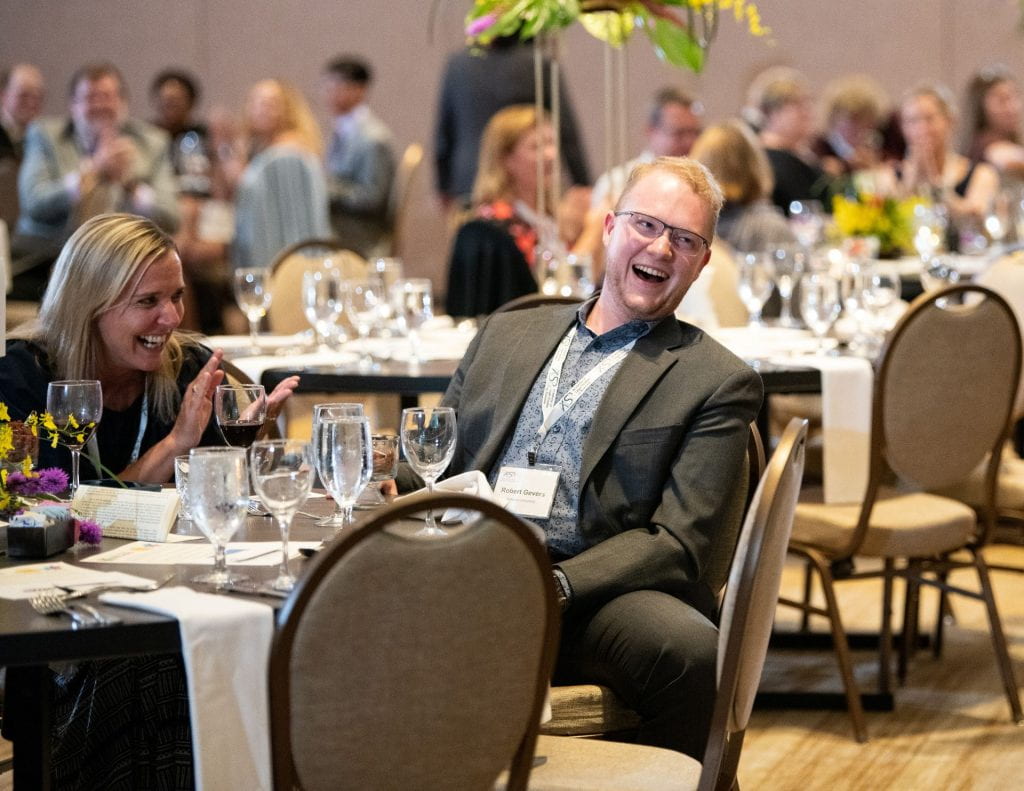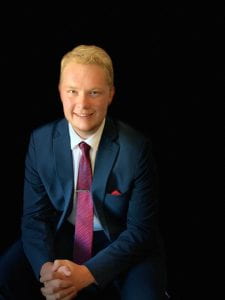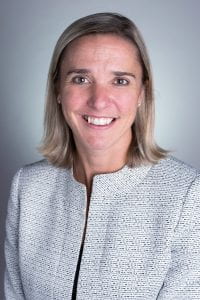
Robert Gevers, center, when he learned that he had won the ALSB’s annual student research paper competition. His mentor, Kelley Professor Shawna Eikenberry, is to his left (Courtesy ALSB).
BLOOMINGTON, Ind. – It was quite the summer for Robert Gevers, a senior studying finance at the Indiana University Kelley School of Business – write a research paper, listen to jazz and blues in New Orleans and Memphis and win a national legal studies competition.
Gevers, from Fort Wayne, Indiana, was one of six students from around the country to present their research papers in person during the annual conference of the Academy of Legal Studies in Business in Louisville, Kentucky.
He was surprised when his paper – on implications of the rise in investment marketing aimed at so-called “retail traders” – was judged as the winner.
The academy that organizes the annual student research paper competition is the leading association of teachers and scholars in the fields of business law, legal environment, and law-related courses outside of professional law schools.

Robert Gevers
One of Gevers’ professors, Shawna Eikenberry, approached him in April about entering the competition, after being impressed by something he wrote for her ethics class. He began start working in earnest on the paper after finals in early May and had to turn it in by the first of June.
But his family also had long-standing plans to take a trip through cultural and musical meccas across the South, including Nashville, Memphis and New Orleans, and then to a Florida beach.
“In the backseat with my mobile hotspot going and 19 hours in the car, I worked on it. I spent much of that vacation and a couple of weeks afterwards doing what I had to do,” Gever recalled.
He took breaks from his research to listen to the blues and eat barbecue at B.B. King’s place on Beale Street in Memphis. His family toured Sun Studios and he got to play the same drums that U2 used when they recorded there in 1987 with King. They stayed on Bourbon Street, visited cemeteries and Preservation Hall, and heard jazz in New Orleans’ French Quarter.
Gevers did all this while continuing to work on the award-winning paper. While the family was in a condo on the Gulf Coast, he edited his paper and worked on the “monstrous” legal citations, all from available resources online.
“Don’t get me wrong, it was a great experience to force myself to do that, but it would have been more fun without doing it,” he said.
Others in the competition often present papers that reflect months and even years of work.
“I was really surprised when I got there and I found that the body of work by the individuals in the competition – of the other five folks who were selected — included senior-year research projects and those that spanned all four years of their undergraduate education,” Gevers said. “Meantime, I had a much more tailored, rushed project, where I built it out over a month and a half, devoting all my time to it.”
Eikenberry said Gevers has taken two of her classes and that he stood out in both, including one class that had more than 100 students and was presented entirely online.
“He was always engaged in the class material and even helped other students with some difficult course material,” she said. “Given my experience with him in class, I had no doubt that he would do a great job.
“We did talk about the possibility of him completing something for next year’s competition, but he seemed ready and willing to give it a go this year despite the shortened time period and despite a pre-planned vacation.”
Gevers said the business law education that he received from Eikenberry “prepared me to understand this wealth of material. Her class and her guidance really helped me get to a mental state where I was understanding what I was reading.” He also acknowledged the training he received in an “intense” honors business writing class, where he had to produce 30-page reports in a short amount of time, and other Kelley classes that taught him how to think logically and analytically.
The student research competition is a unique opportunity for undergraduate students, particularly those interested in the law, because it also is open to master’s and law students. Each finalist had 20 minutes to present their research and five minutes to answer questions from conference attendees. The written paper is worth 50% of the final competition score and the ALSB oral presentation is worth the other half of the final score.

Shawna Eikenberry
One the day of the competition, “Rob knocked the presentation out of the park,” Eikenberry said. “I had a number of people approach me afterwards and tell me how impressed they were with it. Someone even said it was basically like watching a Ted Talk.”
Gevers, who plans to attend law school after graduating from Kelley, also hopes to publish his paper, “The Bull Market of Investment Marketing: Applying the SEC’s Revised Marketing Rule to Advertisement Aimed at Retail Traders.” He said he came up with the idea during the pandemic, when he and friends dabbled in investing.
“Given that retail trader returns are, in reality, no better than those of casino gaming, portraying investment opportunities as a gateway to financial security is misleading,” he wrote in the winning paper. “Brokerage marketing should belong to the same group as marketing for pharmaceuticals and gambling, one in which disclosure of material risks inherent to the activity advertised are required in the name of consumer protection.”
Gevers originally came to IU as direct admit student in the College of Arts & Sciences, to major in neuroscience and with the aspirations of becoming a surgeon. But Gevers also was minoring in business and after taking now-retired Kelley professor Richard Shrimper’s accounting course, he changed course.
After taking a business law class at Kelley, Gevers also realized that he had turned his back too soon on a possible career in the law and following in the footsteps of his father, a criminal law attorney in Fort Wayne and the former elected prosecutor of Allen County.
During Covid, when everyone was learning remotely, he reached out to an aunt who is involved in private equity about an internship. “She got me in the door and next thing you know, I was drafting contracts and all kinds of things for them, and I loved every second of it,” Gevers said.
“It was kind of a strange roller coaster of a journey, but, especially after this experience, I now feel like I’ve really made the right choice, not only coming to Kelley but looking to law school in the future,” Gevers said.
“This win means a great deal to me,” he added. “I am beyond grateful to Kelley for facilitating the opportunity and giving me the skills to succeed. “Truthfully, one of the standout Kelley differentiators is the feeling that opportunity for success is always right around the corner — you just have to ask.”
Gevers wasn’t the only IU student to have success in the competition. Jacob Herbert, a May 2022 IU graduate in economics received honorable mention. He was mentored by Abbey Stemler, associate professor of business law and ethics and Weimer Faculty Fellow, for whom he also served as a Cox Research Scholar.